- Home
- Elizabeth Knox
The Absolute Book
The Absolute Book Read online
Praise for Elizabeth Knox
WAKE (2013)
‘a triumph all of its own. Knox writes with a rare psychological acuity about humans under pressure in a baffling, intolerable predicament.’ —Guardian
‘Elizabeth Knox’s Wake is literary horror that subverts horror’s hoary clichés to brilliant and chilling effect.’ —Financial Times
‘Elizabeth Knox has the most original and lateral literary mind in New Zealand.’ —Metro
‘Knox is a writer with a gift for describing the colour of the present moment . . . she lets her language breathe, lets it speak in revelations rather than explanations.’ —Times Literary Supplement
MORTAL FIRE (2013)
‘I love this book with all of my heart, which is not that surprising, since Elizabeth Knox wrote it. I love all of Elizabeth Knox’s books. Mortal Fire and its heroine, Canny, are that rare thing: real magic.’ —Kelly Link
‘This book is finely wrought magic from start to finish. It has brains; it has heart; it has people to fear and to fall in love with; and it all takes place in a totally beguiling world . . .’ —Margo Lanagan
‘one of the most beautiful and original fantasies I’ve read in a long time’ —Delia Sherman
‘This literary fantasy demonstrates why Knox is one of the premier writers in the genre.’ —The Horn Book
THE ANGEL’S CUT (2009)
‘it’s the passion, exuberance and irrational joy of being human that Xas (and Knox) plump for every time’ —The Australian
‘No New Zealand writer has a stronger lyric gift than Knox; she can make language sing, and at the same time she studs her prose with complex metaphors that expand and enrich the world they describe.’ —NZ Listener
‘The Angel’s Cut offers aching loss with deftness and wistfulness. It is the kind of novel that elicits a sigh at its dénouement. This must surely be one of the books of the year.’ —Metro
ALSO BY ELIZABETH KNOX
After Z-Hour (1987)
Treasure (1992)
Glamour and the Sea (1996)
The Vintner’s Luck (1998)
The High Jump: A New Zealand Childhood (2000)
(Pomare (1994), Paremata (1989), Tawa (1998))
Black Oxen (2001)
Billie’s Kiss (2002)
Daylight (2003)
The Love School: Personal Essays (2008)
The Angel’s Cut (2009)
Wake (2013)
For young adults
Dreamhunter (2005)
Dreamquake (2007)
Mortal Fire (2013)
Visit the author at
www.elizabethknox.com
VICTORIA UNIVERSITY PRESS
Victoria University of Wellington
PO Box 600 Wellington
New Zealand
vup.victoria.ac.nz
Copyright © Elizabeth Knox 2019
First published 2019
This book is copyright. Apart from any fair dealing for the purpose of private study, research, criticism or review, as permitted under the Copyright Act, no part may be reproduced by any process without the permission of the publishers. The moral right of the author has been asserted
ISBN 9781776562305 (print)
ISBN 9781776562619 (EPUB)
ISBN 9781776562626 (Kindle)
A catalogue record for this book is available from the
National Library of New Zealand.
Published with the support of a grant from
Ebook conversion 2019 by meBooks
CONTENTS
Part One | Insects
1 A Book with a Light in Its Long Perspective
2 The Muleskinner
Part Two | Fire
3 Matron of Honour
4 The Library at Princes Gate
5 Documentary Evidence
6 The Bibliothèque Méjanes
Part Three | Light
7 The Island of Apples
8 Norfolk
9 Night in a Tree
10 The Firestarter
11 Nil by Mouth
12 Brutal
Part Four | Damp
13 Failing Kindness
14 The Pale Lady
15 The Summer Road
16 The Island of Women
17 Kernow’s Story
18 Go to Your Gate
19 Questions From the Audience
20 Green Pressure
Part Five | Carelessness
21 Two Graves
22 Basil Cornick’s Screen Test
23 Mimir’s Well
24 A Torah Above the Torah
25 Taken Lightly
26 Quarry House
Part Six | Uncaring
27 The Moot
28 Call and Response
29 Purgatory
30 Neve’s Story
31 Tintern
32 The Folly
Epilogue
33 One Hundred Years, Eighty with Good Behaviour
Part One
Insects
I am Envy, begotten of a chimney-sweeper and an oyster-wife. I cannot read, and therefore wish all books were burnt. I am lean with seeing others eat. O, that there would come a famine through all the world, that all might die, and I live alone! Then thou should’st see how fat I would be. But must thou sit and I stand? Come down, with a vengeance!
—Christopher Marlowe, Doctor Faustus
1
A Book with a Light in Its Long Perspective
When Taryn Cornick’s sister was killed, she was carrying a book. People don’t usually take books when out on a run, but Beatrice must have planned to stop, perhaps at the Pale Lady, where she was often seen tucked in a corner, reading, a pencil behind her ear.
The book in the bag still strapped to Beatrice’s body when Timothy Webber bundled her into the boot of his car was a blockbuster, the mass-market paperback edition, light for its bulk. A novel about tantalising, epoch-spanning conspiracies. Beatrice enjoyed those books, perhaps because they were often set in libraries.
The Cornick girls loved libraries, most of all the one at Princes Gate belonging to their grandfather, James Northover. Beatrice was seventeen, and Taryn thirteen, when their grandfather died. The family had to give up the debt-encumbered house—though Grandma Ruth stayed on in the gatehouse while she continued at her vet’s practice. It was Grandma Ruth whom Beatrice was visiting when Webber found her.
Beatrice and Taryn’s parents were separated. Basil Cornick was in New Zealand, playing the bluff fellow in a fantasy epic. Addy Cornick had been struggling with illness and was dispiriting company. Taryn would spend some of her holidays with her mother, then stay with friends. She never went near Princes Gate, because she couldn’t cope with the changes. A farm conglomerate had taken over the estate. The new owners left the last of the wetlands intact, and the plantation forest with its kernel, a copse of ancient oaks. But the stone walls were dismantled to make long fields with nothing to impede the big harvesting machines—not walls, or drainage ditches, or the hawthorn hedges the foxes had followed.
The library had already gone, broken up before the sale. James Northover’s books passing into the hands of the owners of antiquarian bookshops, except a few long-coveted items which went to his collector friends, perhaps including that ancient scroll box known as ‘the Firestarter’, because it was said to have survived no fewer than five fires in famous libraries.
So, the book bumping against Beatrice’s shoulder blades as she took her last steps was one of those set in an ancient library. A book with a light in its long perspective, like the light of a grail. A book with scholarly heroes and hidden treasure.
Beatrice was running in her baggy sweats and bouncing backpack. It was autumn and there was a light mist. The road between
St Cynog’s Cross and the village of Princes Gate Magna was thickly covered in fallen leaves, its surface amber but for two black streaks where the leaves had been chewed up and tossed aside by the tyres of passing cars. The road was quiet. Beatrice wasn’t wearing headphones. She moved off onto the verge when she heard the car. The mist began to sparkle, and the reflectors on Beatrice’s shoes flashed as the headlights caught them.
Whenever a restless night summoned her sister—her grey sweats and swinging ponytail—Taryn never found herself on that road. She was always in the car. In the driver’s seat. She was the murderer, Timothy Webber. Taryn thought this might be because she had spent so much time wondering why Webber did it. Wondering how anyone does a thing like that.
The trial was held a year after Beatrice died. Taryn attended, and became familiar with every detail of what happened—or at least, what was known.
Webber’s car hadn’t clipped Beatrice because she wasn’t far enough off the tarseal. The police photographs showed a curved tyre track in the black mud. They showed how far he had swerved to catch her. There were no skid marks, because he’d braked already, reducing speed not to pass safely but to hit Beatrice hard enough, he hoped, to subdue her. His car cracked Beatrice’s pelvis, and a roadside oak her skull. He stopped, got out, and scooped Beatrice up from where she lay in the lap of some tree roots. He put her in his boot.
Webber’s lawyers let him take the stand, perhaps hoping his fecklessness would convince the jury that his actions lacked malice. He told the kind of feeble story kids concoct when they’re caught out. He said he put Ms Cornick in his trunk to take her to hospital. But—the prosecution asked—wouldn’t most people place an injured person in the back seat, or not move her at all and wait to flag down the next car?
Webber said he’d been too afraid to wait for someone to come along. It was a quiet road. He wasn’t carrying a phone. It would probably have all gone better for him, he said, if he’d just driven off and had to face a charge of hit-and-run instead of this one. ‘But I couldn’t do that.’ He screwed up his mouth in an expression of apology. ‘Why I put her in my trunk rather than my back seat must have been because she’d soiled herself and was a bit of a mess.’
The jury moaned in anger.
Timothy Webber had been charged with manslaughter, not murder, because, the prosecutor explained to Beatrice’s family, it was very difficult to prove intent. The police didn’t want to risk him getting off altogether. Webber wasn’t a bad character on paper. He had a job. He was an honest and reliable worker. He had no criminal record. He had friends and family. He wasn’t equipped for an abduction, wasn’t carrying rope or duct tape. He hadn’t lined his boot with plastic. He made no attempt to conceal anything, leaving Beatrice’s thrown shoe where it lay, on the road, pointing back the way she’d come. He ran her down, but it was difficult to prove conclusively that it wasn’t an accident. He may have bundled her into his boot and driven off, but in the end all he did was take her another two miles in the direction he’d been going, before performing a U-turn to drive to his sister’s house. His sister called an ambulance. She said to the paramedics, then to the police, ‘Tim just isn’t very bright.’
Beatrice was dead when the ambulance arrived.
Taryn wanted to know what it had been like for her sister, locked in the dark of Webber’s car boot. After the trial, a medical intern friend took a copy of the coroner’s report to his colleague and arranged a meeting so the neurologist could tell Taryn how it might have been.
‘It’s unlikely your sister regained consciousness after the impact,’ said the neurologist. ‘She had a skull fracture, compression fractures in two cervical vertebra, and the crucial thing, a brainstem injury. It was the swelling in your sister’s brainstem that killed her—through uncontrollable blood pressure, and disruptions to the normal rhythms of her heart. If you’re wondering whether she suffered, she almost certainly knew nothing from the moment the car ran into her.’ The neurologist’s look said it all—how he respected Taryn’s need to know. How this was all he could tell her. How he knew it could never be enough.
What he said helped Taryn believe what the jury had believed—that Webber wasn’t a killer with a plan. He hadn’t stalked her sister, and wasn’t prepared. He’d only nurtured a fantasy, then surrendered to an impulse. He pulled the wheel to the left. He picked Beatrice up. But she’d soiled herself, and wasn’t what he had wanted—a woman thrown down, stunned and helpless. It all went wrong for Webber. He didn’t feel what he’d hoped to feel, or get to do what he’d dreamed of doing, and he couldn’t cope with any of it. And, because he didn’t follow through and rape the woman he’d injured and abducted, maybe that’s why he was able to stubbornly insist on his innocence. He hadn’t meant to hurt Beatrice and was indignant that anyone would suggest he had. He just ran into her, then panicked. ‘I was upset,’ he said—almost as if he expected the court to kiss him better.
Webber was convicted of the charge of manslaughter, and sentenced to six years. Five with good behaviour.
Taryn hoped five years would be long enough for her to move on—as people put it, not seeming to understand how she was always on the move, even in her dreams, driving along the amber road as the mist began to sparkle.
As it was it took years for Taryn even to learn to hide her rage. She wanted to keep her friends—not that they were much use to her now, but she understood that they might be one day. In time she’d feel human again, and part of some civil world.
To starve her rage, Taryn stopped talking about Beatrice, not just what had happened—everything. There were stories she would tell about her childhood where she and her mother and father, grandmother and grandfather would be there, in the room of the story, with a ghostly absence, the now unmentionable Beatrice. Taryn couldn’t separate her sister from her death, from the mark on the oak at the fringe of the forest. In Taryn’s memory her sister was a tender wound, Beatrice’s whole life stained with the blood she had shed inside her own head. Taryn was angry—burned and pitted by anger like acid. Other things came with the anger: fearlessness, recklessness, chilliness, insolence.
When Taryn met her husband, Alan Palfreyman, she wasn’t after a man of any sort, let alone a rich one. She only wanted something to eat, a glass of wine, a comfortable place to sit. She’d been caught in Frankfurt Airport by a cancelled flight on a budget airline. She’d had a holiday in Greece, on a beach she went to only at dusk, because the sun was fierce and her skin very fair. She was on her way home—sea salt still powdering her faintly mauve-shaded white skin; salt in her hair too, so that it was curling and almost black in its thicknesses. Taryn was superficially tired and very hungry so she staked out the first-class lounges and shamelessly followed one man, a self-contained individual whose passing glance had registered not exactly interest but passive admiration, as if she were a fine watch and he had enough watches. Taryn followed him up the escalator, and when he was showing his membership card to the woman at the front desk of a hushed and scented lounge, and that woman was saying, ‘Good afternoon Mr Palfreyman,’ Taryn gently slipped her arm through his and said, ‘Mr Palfreyman and guest.’
Alan looked at her in surprise and consented. ‘And guest.’ And they were through, arm in arm.
Taryn was twenty-three when she married, a year younger than Beatrice had been when she died. Webber had three years of his sentence left to run—if he was serving the full sentence. Taryn’s mother had gone. Addy Cornick had been battling breast cancer for years and was in remission when Beatrice was killed. Shortly before Webber’s trial Taryn’s mother had one of her twice yearly check-ups. Taryn went with her mother for the follow-up appointment. When Addy Cornick’s oncologist told her she was still in remission she wept, not with relief, but bitterly, like someone who has had the worst possible news. She wiped her eyes and shrank in her chair, saying to herself, over and over, ‘Do I have to keep doing this?’ Meaning, ‘Must I go on living?’ Then, once the trial was over, Addy lost ground. She g
ave up. She seemed to be in a hurry to leave the world before her daughter’s killer returned to it.
For much of that period Taryn’s father was in New Zealand. Basil Cornick had a role in what he invariably referred to as ‘a juicy fantasy franchise’. It made him a lot of money, though the lonely interactions with imaginary friends and foes in front of a green screen almost robbed him of his lifelong joy in acting. Taryn’s father returned for her wedding. He gave her away. He also gave a speech and got the guests to raise their glasses to Beatrice: ‘My elder girl, who was tragically taken from us by violence, four years ago.’
Taryn carefully avoided looking at her husband. He knew she had a sister, and that Beatrice was dead. But she’d only told him that Bea was hit by a car. Perhaps, when her father was making his overly informative toast, she should have met Alan’s eyes so he’d at least see her wondering what he might be thinking. Taryn had after all wanted to share her life. To at least have a roost, as if she were a solitary ocean-going bird looking for somewhere solid to set down, no matter how bare and exposed it might be.
On her wedding night Alan was still a little under the shadow of the loneliness he’d felt as he sat, his face stiff with shock, hearing his bride’s rather off-putting actor father outline the appalling story of her sister’s murder. The speech had been so strange, somewhere between sentimental and perfunctory. Sitting with his bride on a splendid hotel bed, that loneliness wasn’t a thing Alan could recall in its horrible purity. He refused it, because he loved Taryn, the mysterious woman with wounds so deep she hid them from him. He hadn’t yet begun to think, ‘Who am I to her that she hides a thing like that from me?’ Alan Palfreyman thought too well of himself.
Once they were finally alone, Alan took Taryn’s face between his hands and looked into her eyes. ‘You’re so sad, Taryn, and haunted, and out of step with others.’
Even Taryn could see this was true. She was always studying the world, not rapt or curious, but patient and dutiful, as if the world was something she’d paid good money to see. She was studying it now too—in the shape of Alan’s tender, troubled face. She was listening to the whisper of his smooth palm on the skin of her jaw.

 Revival
Revival Santa's Naughty Helpers
Santa's Naughty Helpers Chaz (Reapers MC Book 14)
Chaz (Reapers MC Book 14) Deceit (The Clans Book 4)
Deceit (The Clans Book 4) Wait on Me (Knights of Retribution MC Book 2)
Wait on Me (Knights of Retribution MC Book 2) Bossed Up (Iron Vex MC Book 2)
Bossed Up (Iron Vex MC Book 2) Booger (Reapers MC Book 3)
Booger (Reapers MC Book 3)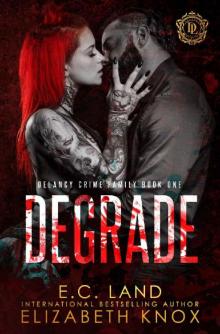 Degrade: A Dark Mafia Romance (DeLancy Crime Family Book 1)
Degrade: A Dark Mafia Romance (DeLancy Crime Family Book 1) Chaos: A Reapers MC Boxset
Chaos: A Reapers MC Boxset Zorro (Reapers MC Book 16)
Zorro (Reapers MC Book 16) Venomous (The Clans Book 11)
Venomous (The Clans Book 11)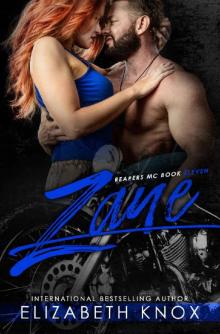 Zane (Reapers MC Book 11)
Zane (Reapers MC Book 11)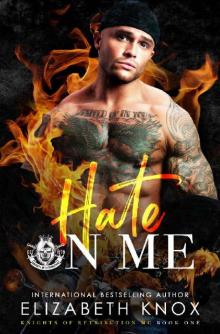 Hate on Me (Knights of Retribution MC Book 3)
Hate on Me (Knights of Retribution MC Book 3) Web of Lies
Web of Lies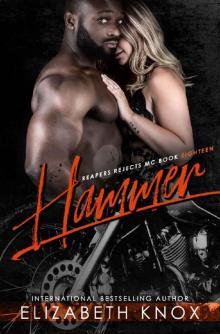 Hammer (Reapers Rejects MC Book 18)
Hammer (Reapers Rejects MC Book 18) Consumed: A Driven World Novel (The Driven World)
Consumed: A Driven World Novel (The Driven World) Anguish
Anguish Frost (Reapers MC Book 15)
Frost (Reapers MC Book 15)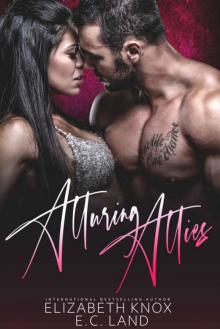 Alluring Allies
Alluring Allies Covert (The Clans Book 9)
Covert (The Clans Book 9) No Limits: A Taboo Anthology
No Limits: A Taboo Anthology Malicious: A Nomad Biker Novel (Raiders of Valhalla MC Book 1)
Malicious: A Nomad Biker Novel (Raiders of Valhalla MC Book 1) Venom's Secret (Iron Vex MC Book 4)
Venom's Secret (Iron Vex MC Book 4)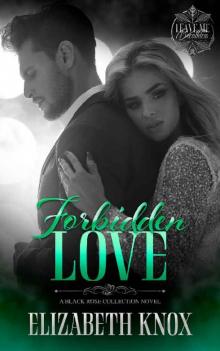 Forbidden Love: Book 1 in the Mackenzie Series (Leave Me Breathless World)
Forbidden Love: Book 1 in the Mackenzie Series (Leave Me Breathless World)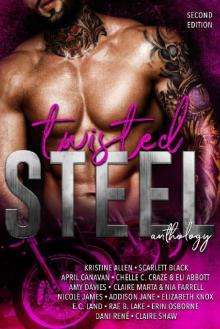 Twisted Steel: An MC Anthology: Second Edition
Twisted Steel: An MC Anthology: Second Edition Mouser (Reapers MC Book 9)
Mouser (Reapers MC Book 9) Sharp Edges (Full Throttle Book 2)
Sharp Edges (Full Throttle Book 2) Blackjack
Blackjack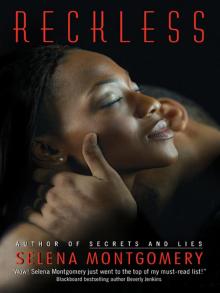 Reckless
Reckless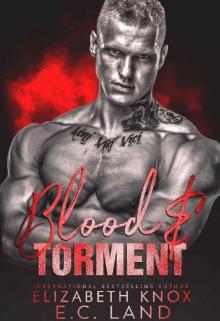 Blood & Torment (Pins and Needles: Moscow Book 2)
Blood & Torment (Pins and Needles: Moscow Book 2)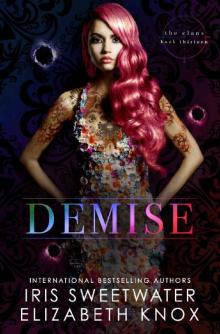 Demise (The Clans Book 13)
Demise (The Clans Book 13)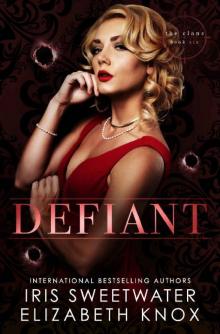 Defiant (The Clans Book 6)
Defiant (The Clans Book 6) Flawed (The Clans Book 12)
Flawed (The Clans Book 12) Amara (Reapers MC Book 12)
Amara (Reapers MC Book 12) Widow (Reapers MC Book 4)
Widow (Reapers MC Book 4)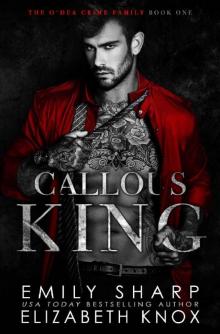 Callous King (The O'Dea Crime Family Book 1)
Callous King (The O'Dea Crime Family Book 1)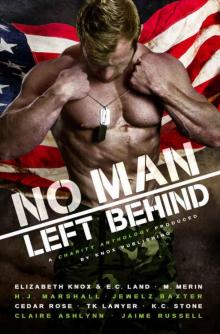 No Man Left Behind: A Veteran Inspired Charity Anthology
No Man Left Behind: A Veteran Inspired Charity Anthology Finley's Adoration
Finley's Adoration Sinister (Raiders of Valhalla MC Book 2)
Sinister (Raiders of Valhalla MC Book 2) Ruthless (The Clans Book 8)
Ruthless (The Clans Book 8)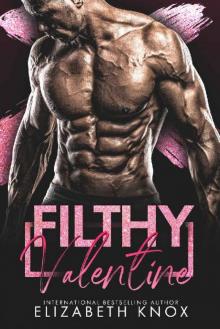 Filthy Valentine: A Dungeon Demons MC Prequel
Filthy Valentine: A Dungeon Demons MC Prequel Havoc- Reapers MC Boxset
Havoc- Reapers MC Boxset Mayhem: A Reapers MC Boxset
Mayhem: A Reapers MC Boxset The Absolute Book
The Absolute Book Dangerous Love (Mackenzies Book 3)
Dangerous Love (Mackenzies Book 3)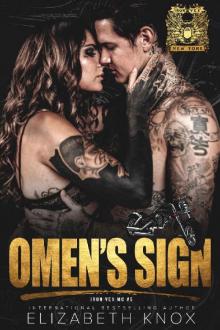 Omen's Sign (Iron Vex MC Book 5)
Omen's Sign (Iron Vex MC Book 5) Call My Bluff: A Las Vegas Themed Anthology
Call My Bluff: A Las Vegas Themed Anthology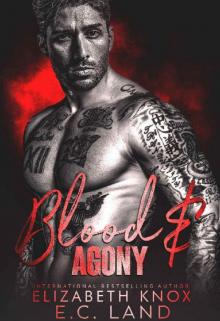 Blood & Agony: A Dark Criminal Romance (Pins and Needles: Moscow Book 1)
Blood & Agony: A Dark Criminal Romance (Pins and Needles: Moscow Book 1)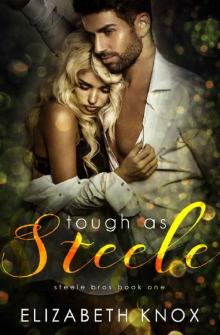 Tough as Steele (Steele Bros Book 1)
Tough as Steele (Steele Bros Book 1) Dixon (Reapers MC Book 10)
Dixon (Reapers MC Book 10) Stripping a Steele (Steele Bros Book 2)
Stripping a Steele (Steele Bros Book 2)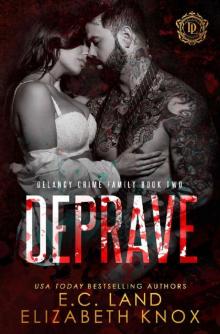 Deprave (DeLancy Crime Family Book 2)
Deprave (DeLancy Crime Family Book 2) Vex's Temptation
Vex's Temptation Stripping a Steele
Stripping a Steele Dreamhunter
Dreamhunter The Trade
The Trade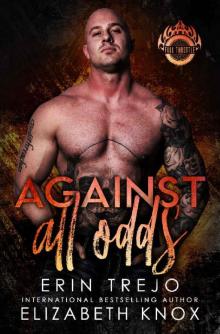 Against All Odds (Full Throttle Book 1)
Against All Odds (Full Throttle Book 1) Call My Bluff
Call My Bluff Sydney's Battle (Reapers Rejects MC: Second Generation Book 1)
Sydney's Battle (Reapers Rejects MC: Second Generation Book 1) The Angel's Cut
The Angel's Cut Dreamquake
Dreamquake Dreamquake: Book Two of the Dreamhunter Duet
Dreamquake: Book Two of the Dreamhunter Duet Reckoning (Skulls Renegade MC Book 5)
Reckoning (Skulls Renegade MC Book 5)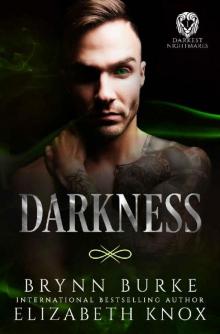 Darkness (Darkest Nightmares Book 1)
Darkness (Darkest Nightmares Book 1) Switched (Sin City Fets Book 1)
Switched (Sin City Fets Book 1)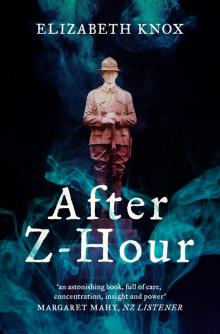 After Z-Hour
After Z-Hour Axel (Reapers MC Book 17)
Axel (Reapers MC Book 17) A Visit to the House on Terminal Hill
A Visit to the House on Terminal Hill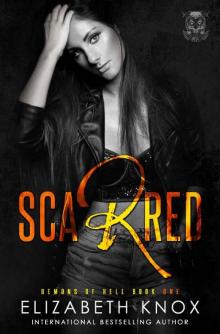 Scarred (Demons of Hell MC Book 1)
Scarred (Demons of Hell MC Book 1) Stolen Hearts: A Dark Billionaire Collection
Stolen Hearts: A Dark Billionaire Collection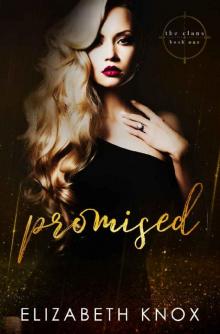 Promised (The Clans Book 1)
Promised (The Clans Book 1) The Trade (The Clans Book 2)
The Trade (The Clans Book 2) Revenge
Revenge Daylight
Daylight Redemption
Redemption Overzealous Alphas
Overzealous Alphas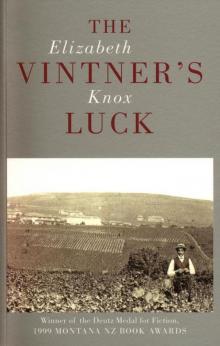 The Vintners Luck
The Vintners Luck Wake
Wake Corrupted Love: A Dark Mafia Romance (Mackenzies Book 2)
Corrupted Love: A Dark Mafia Romance (Mackenzies Book 2)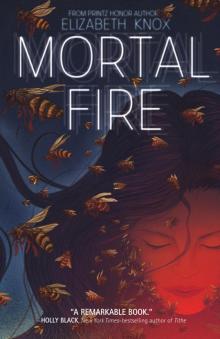 Mortal Fire
Mortal Fire Reckoning
Reckoning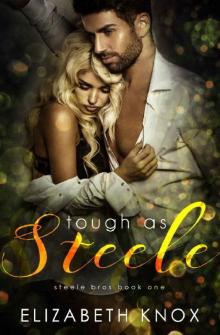 Tough as Steele
Tough as Steele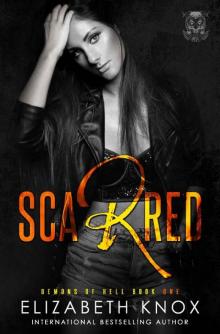 Scarred
Scarred Relentless (Skulls Renegade Book 4)
Relentless (Skulls Renegade Book 4)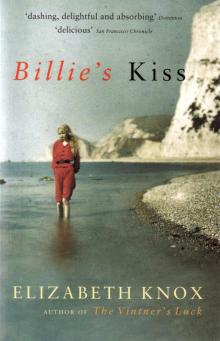 Billie's Kiss
Billie's Kiss Reclaimed (Skulls Renegade MC Book 6)
Reclaimed (Skulls Renegade MC Book 6)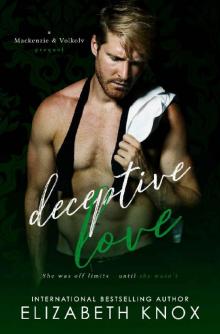 Deceptive Love: A Dark Mafia Duet (Mackenzie & Volkolv Book 1)
Deceptive Love: A Dark Mafia Duet (Mackenzie & Volkolv Book 1)